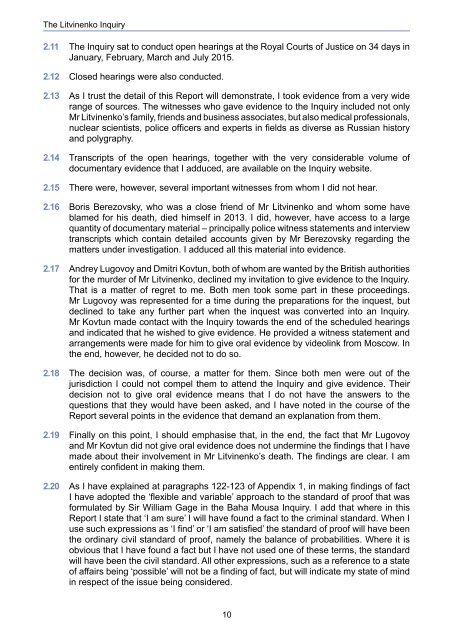The Litvinenko Inquiry
2429870
2429870
Create successful ePaper yourself
Turn your PDF publications into a flip-book with our unique Google optimized e-Paper software.
<strong>The</strong> <strong>Litvinenko</strong> <strong>Inquiry</strong><br />
2.11 <strong>The</strong> <strong>Inquiry</strong> sat to conduct open hearings at the Royal Courts of Justice on 34 days in<br />
January, February, March and July 2015.<br />
2.12 Closed hearings were also conducted.<br />
2.13 As I trust the detail of this Report will demonstrate, I took evidence from a very wide<br />
range of sources. <strong>The</strong> witnesses who gave evidence to the <strong>Inquiry</strong> included not only<br />
Mr <strong>Litvinenko</strong>’s family, friends and business associates, but also medical professionals,<br />
nuclear scientists, police officers and experts in fields as diverse as Russian history<br />
and polygraphy.<br />
2.14 Transcripts of the open hearings, together with the very considerable volume of<br />
documentary evidence that I adduced, are available on the <strong>Inquiry</strong> website.<br />
2.15 <strong>The</strong>re were, however, several important witnesses from whom I did not hear.<br />
2.16 Boris Berezovsky, who was a close friend of Mr <strong>Litvinenko</strong> and whom some have<br />
blamed for his death, died himself in 2013. I did, however, have access to a large<br />
quantity of documentary material – principally police witness statements and interview<br />
transcripts which contain detailed accounts given by Mr Berezovsky regarding the<br />
matters under investigation. I adduced all this material into evidence.<br />
2.17 Andrey Lugovoy and Dmitri Kovtun, both of whom are wanted by the British authorities<br />
for the murder of Mr <strong>Litvinenko</strong>, declined my invitation to give evidence to the <strong>Inquiry</strong>.<br />
That is a matter of regret to me. Both men took some part in these proceedings.<br />
Mr Lugovoy was represented for a time during the preparations for the inquest, but<br />
declined to take any further part when the inquest was converted into an <strong>Inquiry</strong>.<br />
Mr Kovtun made contact with the <strong>Inquiry</strong> towards the end of the scheduled hearings<br />
and indicated that he wished to give evidence. He provided a witness statement and<br />
arrangements were made for him to give oral evidence by videolink from Moscow. In<br />
the end, however, he decided not to do so.<br />
2.18 <strong>The</strong> decision was, of course, a matter for them. Since both men were out of the<br />
jurisdiction I could not compel them to attend the <strong>Inquiry</strong> and give evidence. <strong>The</strong>ir<br />
decision not to give oral evidence means that I do not have the answers to the<br />
questions that they would have been asked, and I have noted in the course of the<br />
Report several points in the evidence that demand an explanation from them.<br />
2.19 Finally on this point, I should emphasise that, in the end, the fact that Mr Lugovoy<br />
and Mr Kovtun did not give oral evidence does not undermine the findings that I have<br />
made about their involvement in Mr <strong>Litvinenko</strong>’s death. <strong>The</strong> findings are clear. I am<br />
entirely confident in making them.<br />
2.20 As I have explained at paragraphs 122-123 of Appendix 1, in making findings of fact<br />
I have adopted the ‘flexible and variable’ approach to the standard of proof that was<br />
formulated by Sir William Gage in the Baha Mousa <strong>Inquiry</strong>. I add that where in this<br />
Report I state that ‘I am sure’ I will have found a fact to the criminal standard. When I<br />
use such expressions as ‘I find’ or ‘I am satisfied’ the standard of proof will have been<br />
the ordinary civil standard of proof, namely the balance of probabilities. Where it is<br />
obvious that I have found a fact but I have not used one of these terms, the standard<br />
will have been the civil standard. All other expressions, such as a reference to a state<br />
of affairs being ‘possible’ will not be a finding of fact, but will indicate my state of mind<br />
in respect of the issue being considered.<br />
10


